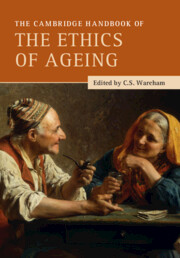Book contents
- The Cambridge Handbook of the Ethics of Ageing
- Cambridge Handbooks in Philosophy
- The Cambridge Handbook of the Ethics of Ageing
- Copyright page
- Contents
- Contributors
- Acknowledgements
- Introduction
- Part I Ageing and the Good Life
- Part II Ageing and Morality
- Part III Ageing and Society
- 14 ‘To Grandmother’s House We Go’: On Women, Ethics, and Ageing
- 15 Ageing, Unequal Longevities and Intergenerational Justice
- 16 Ageing, Justice, and Work: Alternatives to Mandatory Retirement
- 17 Age and Well-Being: Ethical Implications of the U-Curve of Happiness
- 18 The Desirability and Morality of Life Extension
- References
- Index
17 - Age and Well-Being: Ethical Implications of the U-Curve of Happiness
from Part III - Ageing and Society
Published online by Cambridge University Press: 23 August 2022
- The Cambridge Handbook of the Ethics of Ageing
- Cambridge Handbooks in Philosophy
- The Cambridge Handbook of the Ethics of Ageing
- Copyright page
- Contents
- Contributors
- Acknowledgements
- Introduction
- Part I Ageing and the Good Life
- Part II Ageing and Morality
- Part III Ageing and Society
- 14 ‘To Grandmother’s House We Go’: On Women, Ethics, and Ageing
- 15 Ageing, Unequal Longevities and Intergenerational Justice
- 16 Ageing, Justice, and Work: Alternatives to Mandatory Retirement
- 17 Age and Well-Being: Ethical Implications of the U-Curve of Happiness
- 18 The Desirability and Morality of Life Extension
- References
- Index
Summary
While many expect happiness to decline in old age, research into well-being and happiness suggests otherwise. Happiness is U-curved, with the bottom of the U, the unhappiest part, experienced in middle age, and happiness increasing thereafter. This surprising diachronic phenomenon presents ethical questions concerning the way we perceive our own and other people's lives, and how individuals and society ought to respond to ageing. I claim the U-curve could influence, inter alia, our attitudes to our own ageing, debates concerning prioritisation of the elderly in health decisions, and attitudes towards end-of-life decisions. As an example of how the U-curve can influence the conclusion of an applied ethical problem in population ethics, I revisit Peter Singer’s claim that substantially extending later life would reduce total utility. With some qualifications, I defend Mark Walker’s claim that, in undermining the crucial empirical assumption that life gets worse as we age, the U-curve casts doubt on Singer’s critique of life extension.
- Type
- Chapter
- Information
- The Cambridge Handbook of the Ethics of Ageing , pp. 243 - 256Publisher: Cambridge University PressPrint publication year: 2022
- 1
- Cited by



